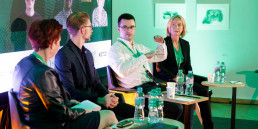Half of the world’s population lives in urban areas today. The global population will be two-thirds urban by 2050. There will be a constant need for food for all of these people. Most food for people living in cities is produced elsewhere—normally by farmers in rural areas. An ecosystem may be considered incomplete if it lacks all of its necessary components. Environmental impacts can be high when an ecosystem is incomplete.
Urban agriculture received special attention at the AgriFood Forum 2022. 3 guests were invited for the discussion, including Paulius Chockevičius, founder of Urbanbee.lt, Marius Krutulis, founder & CEO at Daržulis and Aušra Sičiūnienė representing Vilnius City Municipality. Urban agriculture was explained by the participants of the discussion along with the challenges they face.
Aušra Sičiūnienė: We need enthusiastic people in urban agriculture
As a representative of the Vilnius City Municipality, Aušra Sičiūnienė explained the situation in the city of Vilnius. During her speech, she discussed the ownership of the city between the state and private individuals, saying that Vilnius does not own the land itself. As a result, the situation becomes more complicated.
In the following sections, she discussed some of the successful fostering activities. Some kindergartens have their own greenhouses where kids can see cucumbers grow, and they even get to eat the vegetables themselves. In most cases, the problem arises when kids and schoolchildren are away on vacation and no one is taking care of agriculture. Broadening this initiative is challenging.
She believes people distrust the municipal economy and are very wary about such initiatives, or rather suspicious about the purity of cultivated products. Additionally, dogs, cats, and even people themselves can litter these areas.
Finally, Aušra Sičiūnienė highlighted the lack of enthusiasm and the need for interested and motivated people in order to move things forward.
“Daržulis” and vertical farming
Vertical farming involves taking the controlled environment of a modern greenhouse to a whole new level. Vertical farming allows 10 times the yield for a given area by stacking plants vertically on shelves or tall pillars. It is this method that is used to grow all products at “Daržulis”. In a microclimate with multiple systems and automation, they work indoors. In addition to increasing food production, vertical farming reduces the agricultural sector’s environmental impact, reduces the use of water, chemicals, and fertilizers, and increases efficiency.
Marius Krutulis, founder & CEO of “Daržulis”, shared that even though the initiative has been successful now, it was difficult to begin. In a humorous comment, he joked that he did not have a handbook with detailed instructions on how to succeed. It’s only possible to do everything by yourself after many tests and trials. The need for funding is another obstacle to growth.
Beekeeping in the cities of Lithuania
Paulius Chockevičius founded his company Urbanbee.lt to take urban agriculture to the next level. They are responsible for maintaining beehives and caring for the bees constantly.
While working on beekeeping, Paulius said most urbanites do not support the activity because they are afraid to be stung by bees. Also, most people think that honey produced in urban areas can be contaminated and full of heavy metals, and they don’t trust its quality. However, Paulius Chockevičius stressed that honey and bees are always certified and checked for quality.
It is relevant to mention that the infrastructure in the cities of Lithuania is not suited for beekeeping. “Throughout the whole of Vilnius or Kaunas, we have huge plots that are not being used in an urban environment. So, we have to climb a lot of ladders. Contrary to this, a lot of western countries have adopted and built green rooftops.” – said the founder of Urbanbee.lt.
Bees play an extremely crucial role in the ecosystem, which is why it is important to educate people in communities about them.

